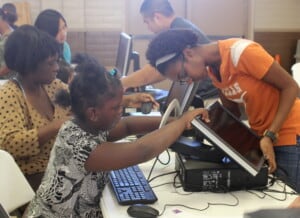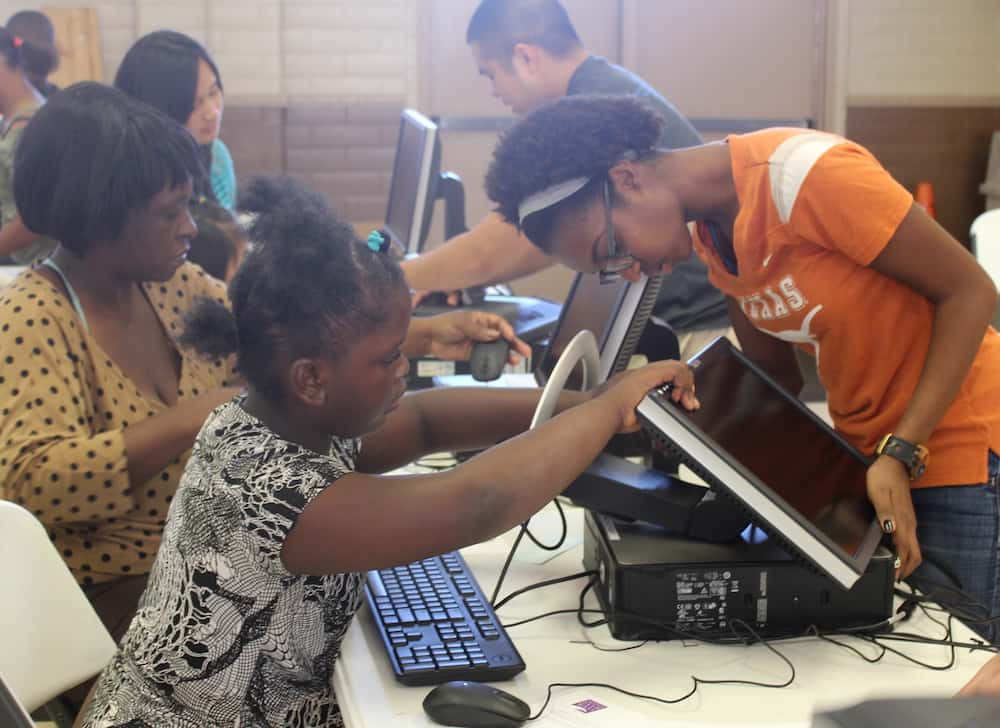Social work students collaborate with Google to bridge the digital divide in Austin
Addis Gezahegn does not remember a time before the Internet.
“I’ve grown with it. It has helped me with homework, college applications… it’s just vital,” she says.
Gezahegn, a social work junior at The University of Texas at Austin with a passion for education equality, also knows that, as vital the Internet is nowadays, many families cannot afford the service or computers to access it.
According to the Census Bureau, one in four families still don’t access the Internet at home. When zeroing on low-income families, the digital divide gets wider: in Austin, only 15 percent of public housing families have an Internet connection, and fewer than 30 percent own a computer.

“When I saw that HACA and Google were trying to address this digital divide in Austin, I thought it was a good opportunity. I want kids in public housing to have access to the Internet on the same level with other kids,” Gezahegn says.
She refers to Unlocking the Connection, a program of the Housing Authority of the City of Austin (HACA) in collaboration with Google Fiber and other partners to help the more than 4,300 Austin’s public housing residents access basic broadband and digital literacy training. Families can register for free basic Internet services, and adults and children can earn free refurbished computers after completing computer classes.
UT Austin students have joined this initiative through the Google Community Leaders program. As part of the first cadre, Gezahegn and social work junior Reginald (Reggie) Smith received career mentoring from Google and collaborated with HACA in Unlocking the Connection activities.
“Google Community Leaders were able to guide residents and personalize their orientation toward their new computer, making it relevant to what people wanted to do with them,” explains Catherine Crago, head of strategic initiatives and resource development at the HACA’s nonprofit subsidiary that is leading Unlocking the Connection.
Gezahegn initially worried that her knowledge of computers was not enough.
“But then, during my first computer deployment, one mother asked me how to do a capital letter on the keyboard so I thought, I can do this! It was really starting from the basics. And it was cool to know that the family was getting the new computer home and could play with it more,” she says.
Social work skills were handy during the computer deployments because, as Crago explains, a new device usually changes family dynamics. For instance, during orientations residents create passwords and learn about safety and security. Crago remembers the case of two boys who, without their parents’ knowledge, tried to reverse the computer setup so that they had the administrator password and their parents had the user one.
“The parents didn’t have an understanding of what was going on but Reggie (Smith) observed this, and was able to deliver a social work intervention right on the spot. He affectionately called the boys ‘double trouble,’ set them aside, and talked to the parents,” Crago says.
Smith explained the parents that they should keep administrator privileges but he only got blank stares and then a shy question… what is an administrator?
“So I explained to them that they could override the kids’ passwords, and also check what they were doing on the computer. I also said that it was a good idea to place the computer strategically in the house so they could keep an eye on it instead of just sticking it into the kids’ room,” Smith remembers.
“Reggie was able to clarify roles for the parents on the spot: there is the technical expert role, and then there is the role of who is in charge of the family,” Crago adds. “I think this ability is unique to social work, something that folks with only a technical background might not perceive.”
Smith also used his interpersonal skills to facilitate a meeting with HACA ambassadors – residents who graduated first from the program and are trained to help other residents at the properties’ computer labs.
“We were trying to understand what people had learned, and Reggie was able to navigate that fine line between reflection and action. That’s very valuable in a business sense, understanding where we have been, what we have learned, and where we need to go,” Crago says.
Gezahegn, in addition to participating in deployments, collaborated with another Google Community Leader, a UT Austin communications major, in designing and producing an insert for the monthly newsletter that HACA sends to all residents.
“The insert explains what digital inclusion is, the benefits of the Internet, how to earn a computer, where to take the classes, and so on. In the first two weeks after the newsletter was delivered, HACA received sixteen calls about the program! That was very exciting,” Gezahegn says with a satisfied smile.
Through her participation in this program, Gezahegn realized how versatile social work skills are.
“We have administrative, logistical skills to get things done but we can also switch and work one on one with community members,” she says. “We know how to do both.”
Posted June 10, 2016. By Andrea Campetella. Photos by HACA.


